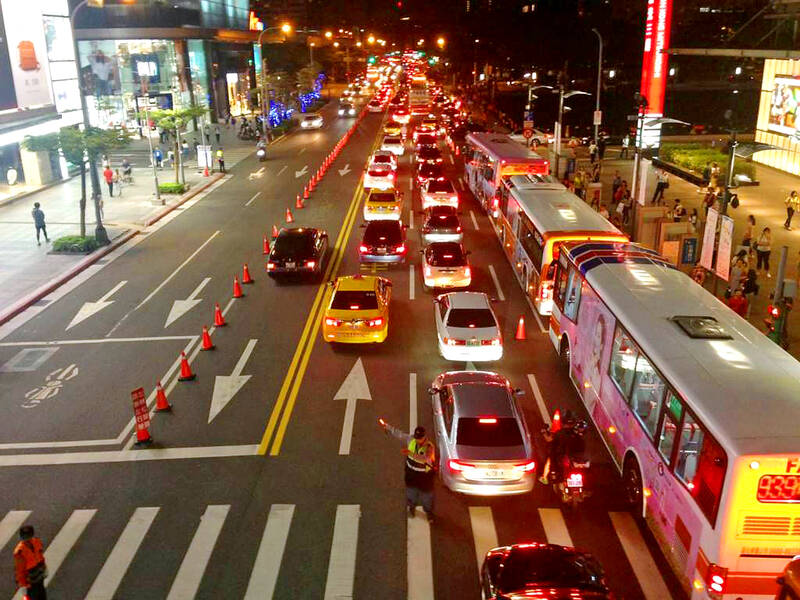交通規則是每個人日常生活不可避免的一部分,不明所以的上路出門將承擔人身安全風險或錢包遭殃的代價。交通情境更是TOEIC常考的內容之一。透過這次的交通新制上路,我們從規則、罰款和駕照三大部分來學TOEIC常考字吧!
交通規則說法
交通規則英文一共有三種說法,分別是traffic laws、traffic regulations、traffic rules。

Photo taken from Facebook / 照片取自臉書
1. laws是法律,所以traffic laws指的就是和交通相關的法律條文。2. regulation則是來自於regulate(規範),因為交通有各式各樣的行為都是受到規範的,所以可以用traffic regulations來表示交通規則。但其實regulation最常見的用法還是一些相關部門或企業的principles or regulations governing conducts(希望大家遵守的行為方式)。3. 而英文字rules,和交通相關的詞就是traffic rules,這個字也較常搭配比賽使用,例如contest rules或game rules。
The newly amended air pollution law has aroused wide controversy.
(新修訂的空污法激起了廣泛的爭議。)
Many financial leaders around the globe are calling for stricter regulations for crypto currencies.
(全球許多的金融領袖正呼籲對加密貨幣進行更嚴格的規範。)
Tabletop games with complex rules are not for beginners.
(具有複雜規則的桌遊不適合新手。)
守規則與違規
守規則有兩個主要的英文說法是follow與obey,follow來自於跟從,obey的原意是服從,所以當我們跟從或服從特定的規定,自然就是遵守規則。而違規也有最基本的三種英文說法,分別是break、violate和offend。
這三個英文單字,最口語的說法是break(打破),但要特別注意break the rule(打破常規)也可以是正面意思。而違規較正式的說法是violate,它來自於拉丁文的violatus,與violence(暴力)是同一個語源。若你想把這個單字背起來,你可以把violate想像成是使用暴力時侵犯到某些規則。另外,動詞offend(冒犯)可以用來表達違規,但在使用時通常要轉化成為名詞,例如traffic offender。
Sometimes it pays off to break the rules.
(有時打破常規是會值得的。)
The new business idea may violate international law.
(這個新的商業想法可能會違反國際法。)
Habitual traffic offenders should receive more severe punishments.
(交通慣犯應該接受更為嚴厲的處罰。)
處罰英文怎麼說?
被抓到違規後當然要接受處罰啦,由於交通處罰大多是用罰款來處理,所以最常用的字就是fine。Fine當成形容詞的意思是「好的」,如It’s a fine day,但當成動詞或是名詞時的意思則是「罰款」。
The company is facing a huge fine for violating several trade regulations.
(該公司因為違反數條貿易規範而面臨巨額罰款。)
除了fine之外,處罰也可以penalty來表示。Penalty這個字相信最近會被許多人討論,因為世足賽上的「罰12碼球」就稱為Penalty kick,也就是PK(一對一挑戰)的由來。除了足球,在日常生活中遇到任何的違規被罰,只要是「付出代價」性質的都可以用penalty來表示。
The train company will hike the penalty on ticketless travelers to prevent this behavior.
(該火車公司將會大幅加重對無票乘客的處罰,以防止此行為。)
最後要講的是最常見的處罰單字punishment,例如體罰就是corporal punishment。若要交通情境中使用punishment,就以punishment for加上違規行為的後果或是處罰即可。
The maximum punishment for DUI in Taiwan is a NT$90,000 fine.
(酒駕在台灣的最高處罰是罰款90,000新台幣。)
※Driving under the influence (of alcohol),常簡寫為DUI 。
證照英文說法
在英文中最常見的證照有四種說法,前兩者是交通常用的license和permit,後兩者certificate和diploma則用於其他情境。
證照在交通情境中非常重要,無論你是開車或騎車,駕照(driver’s license)是一定要有的。License的意思是表達特許、許可的意思,(英式拼法則是licence)。另外,由於販售特別的產品也需要許可,例如菸酒類產品,所以售酒執照便稱為liquor license。
The license needs to be renewed every two years.
(許可證需要每兩年更新一次。)
Permit來自於動詞許可,名詞就是許可證,但是當成名詞時發音重音節要移動到第一音節(正確發音:http://www.dictionary.com/browse/permit?s=t)。
You need a valid parking permit to get into the underground parking.
(您需要效期內的停車證才能進入地下室。)
而與交通較無關certificate主要是用來表達完成某件事物、或可以進行某種行為的證明,例如course completion certificate(完課證明)或trainer certificate(講師證)。Diploma則是專指文憑,而且需要在前方加上學籍等級,如high school diploma(高中畢業文憑)或college diploma(大學文憑)。
【多益模擬試題】
1. To minimalize the risk, Roy ____ the steps listed in the manual carefully.
(A) skips
(B) follows
(C) dances
(D) invents
2. Flexible ____ are introduced to create more opportunities for technology ventures.
(A) hose
(B) trips
(C) nature
(D) regulations
解析:
1. 正解為(B)。題意為「為了將風險最小化,Roy小心翼翼地遵守手冊中列出的步驟。」follow the steps意思為「遵守」步驟,小心遵守手冊中的步驟便能讓風險最小化。(A) skips the steps「跳過步驟」、(C) dance the steps「跳出…的舞步」和(D) invent「發明」皆與題意不符,故正解為(B) follow the steps「遵守步驟」。
2. 正解為(D),題意為「引進有彈性的規範以創造更多機會給科技創投。」。選項(A) hose「軟管」、(B) trips「旅程」和(C) nature「天性」雖然都可以與flexible搭配,但是與本題意不符,故答案為(D) regulations「規定、規範」。
SOURCE: https://www.englishok.com.tw/toeic/toeic-issue/traffic-rules-and-law-do-not-get-fine
文章由TOEIC Program Taiwan · Chun Shin提供:
www.facebook.com/ToeicProgramTaiwan

In an effort to fight phone scams, British mobile phone company O2 has introduced Daisy, an AI designed to engage phone con artists in time-wasting conversations. Daisy is portrayed as a kindly British granny, exploiting scammers’ tendency to target the elderly. Her voice, based on a real grandmother’s for authenticity, adds to her credibility in the role. “O2” has distributed several dedicated phone numbers online to direct scammers to Daisy instead of actual customers. When Daisy receives a call, she translates the scammers’ spoken words into text and then responds to them accordingly through a text-to-speech system. Remarkably, Daisy

Bilingual Story is a fictionalized account. 雙語故事部分內容純屬虛構。 Emma had reviewed 41 resumes that morning. While the ATS screened out 288 unqualified, she screened for AI slop. She could spot it a mile away. She muttered AI buzzwords like curses under her breath. “Team player.” “Results-driven.” “Stakeholder alignment.” “Leveraging core competencies.” Each resume reeked of AI modeling: a cemetery of cliches, tombstones of personality. AI wasn’t just changing hiring. It was draining the humanity from it. Then she found it: a plain PDF cover letter. No template. No design flourishes. The first line read: “I once tried to automate my

Every May 1, Hawaii comes alive with Lei Day, a festival celebrating the rich culture and spirit of the islands. Initiated in 1927 by the poet Don Blanding, Lei Day began as a tribute to the Hawaiian custom of making and wearing leis. The idea was quickly adopted and officially recognized as a holiday in 1929, and leis have since become a symbol of local pride and cultural preservation. In Hawaiian culture, leis are more than decorative garlands made from flowers, shells or feathers. For Hawaiians, giving a lei is as natural as saying “aloha.” It shows love and

1. 他走出門,左右看一下,就過了馬路。 ˇ He walked outside, looked left and right, and crossed the road. χ He walked outside and looked left and right, crossed the road. 註︰並列連接詞 and 在這句中連接三個述語。一般的結構是 x, y, and z。x and y and z 是加強語氣的結構,x and y, z 則不可以。 2. 他們知道自己的弱點以及如何趕上其他競爭者。 ˇ They saw where their weak points lay and how they could catch up with the other competitors. χ They saw where their weak points lay and how to catch up with the other competitors. 註:and 一般連接同等成分,結構相等的單詞、片語或子句。誤句中 and 的前面是子句,後面是不定詞片語,不能用 and 連接,必須把不定詞片語改為子句,and 前後的結構才相等。 3. 她坐上計程車,直接到機場。 ˇ She took a cab, which took her straight to the airport. ˇ She took a cab and it took her straight